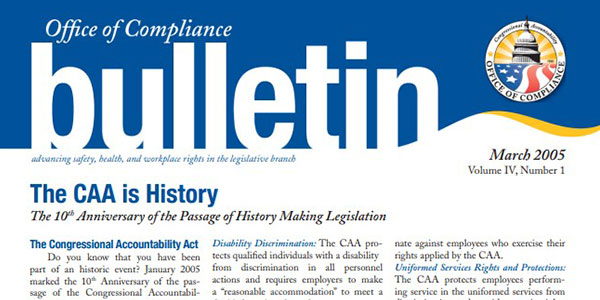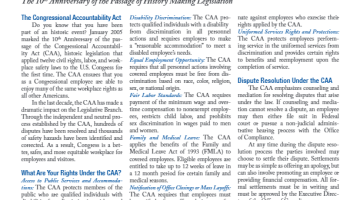The 10th Anniversary of the Passage of History Making Legislation
The Congressional Accountability Act
Do you know that you have been part of an historic event? January 2005 marked the 10th Anniversary of the passage of the Congressional Accountability Act (CAA), historic legislation that applied twelve civil rights, labor, and workplace safety laws to the U.S. Congress for the first time. The CAA ensures that you as a Congressional employee are able to enjoy many of the same workplace rights as all other Americans.
In the last decade, the CAA has made a dramatic impact on the Legislative Branch. Through the independent and neutral process established by the CAA, hundreds of disputes have been resolved and thousands of safety hazards have been identified and corrected. As a result, Congress is a better, safer, and more equitable workplace for employees and visitors.
What Are Your Rights Under the CAA?
Access to Public Services and Accommodations: The CAA protects members of the public who are qualified individuals with disabilities from discrimination with regard to access to public services, programs, activities, or places of public accommodation in Legislative Branch facilities and programs.
Age Discrimination: The CAA provides that all personnel actions affecting covered employees shall be free from age discrimination for those 40 years old or older.
Collective Bargaining and Unionization: The CAA permits certain Legislative Branch employees to form, join, and assist a labor organization. (Does not currently apply to all Legislative Branch employees)
Disability Discrimination: The CAA protects qualified individuals with a disability from discrimination in all personnel actions and requires employers to make a “reasonable accommodation” to meet a disabled employee’s needs.
Equal Employment Opportunity: The CAA requires that all personnel actions involving covered employees must be free from discrimination based on race, color, religion, sex, or national origin.
Fair Labor Standards: The CAA requires payment of the minimum wage and overtime compensation to nonexempt employees, restricts child labor, and prohibits sex discrimination in wages paid to men and women.

